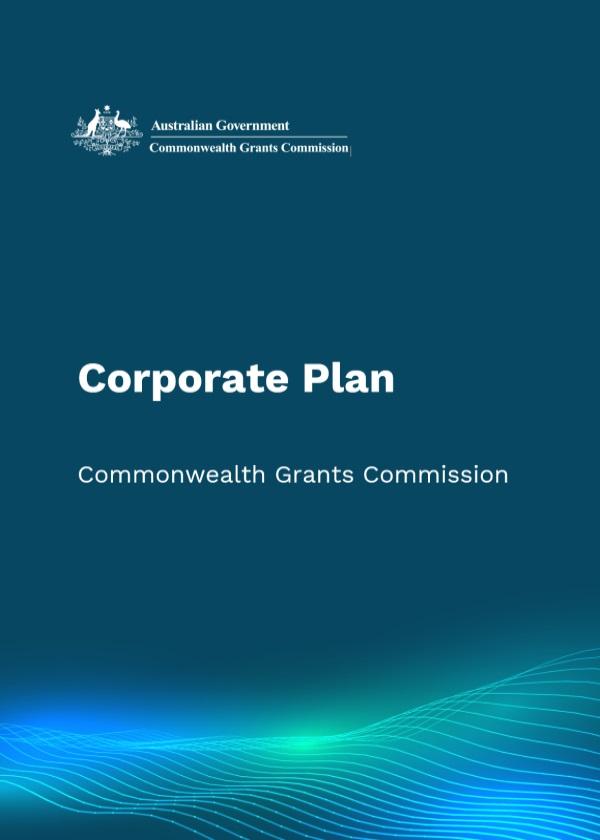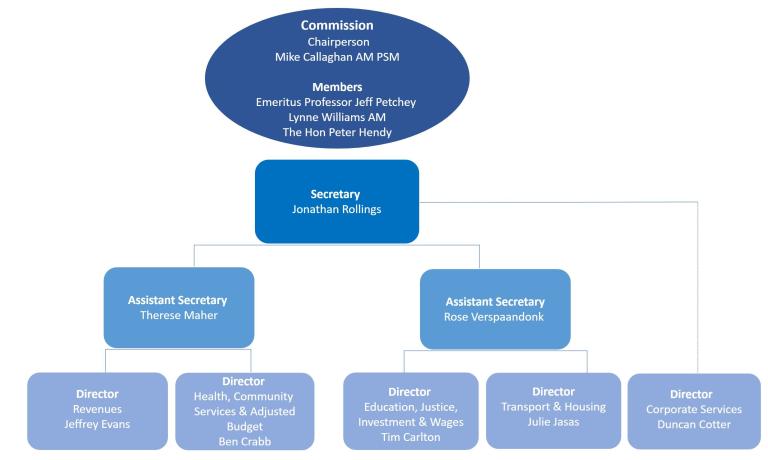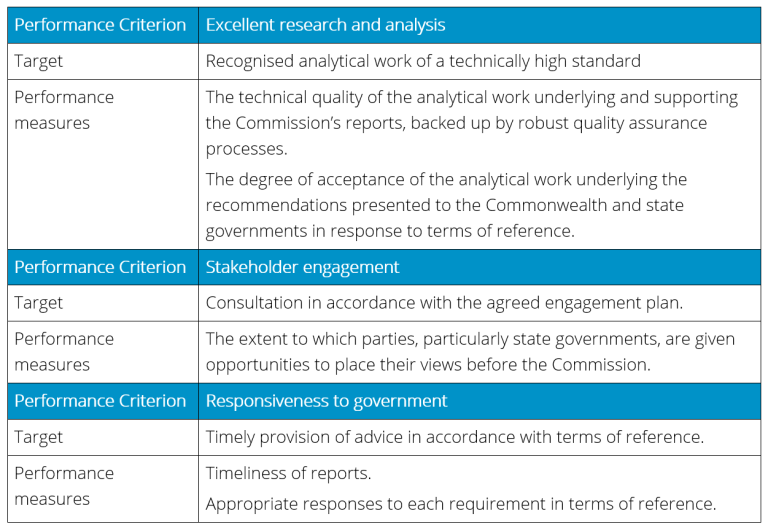Corporate Plan 2021-22

Introduction
As the accountable authority, I present the Commonwealth Grants Commission’s 2021-22 Corporate Plan, covering the period 2021-22 to 2024-25, as required under section 35(1)(b) of the Public Governance, Performance and Accountability Act 2013.
As it has done since 1933, the Commonwealth Grants Commission continues to play a key role in Australia’s framework for federal financial relations. The CGC’s advice to the Government on the distribution of the GST among the states is currently set against the background of the significant pressure COVID-19 is placing on state budgets.
In 2021-22, we will provide advice on the GST distribution for the 2022-23 financial year. This will be the second year of transition to legislated changes to the GST distribution arrangements. Our assessments of state fiscal capacities will use methods from the 2020 Methodology Review. The Commission continues to improve its assessment processes and is beginning preparations for the next methods review.
We will continue to enhance our communication and engagement with state and territory Treasuries and the broader community, including by continuing the Commission’s series of Occasional and Research papers. We will progress initiatives to further improve the presentation of the annual Update on GST Revenue Sharing Relativities and will also enhance our website with more engaging and accessible content.
The CGC will maintain our focus on attracting and retaining a highly skilled, motivated and diverse workforce, with particular expertise in data and statistical analysis. We will also progress the project to enhance our ICT infrastructure, including the core ICT platform for analysing state fiscal data.
In accordance with the requirements of the PGPA Act, this plan provides an overview of our operating environment, capabilities and how we will measure performance. I look forward to reporting on our performance in the annual performance statements in the CGC Annual Report.
Jonathan Rollings
Secretary
Commonwealth Grants Commission
August 2021
Purpose
The Commonwealth Grants Commission’s purpose is to provide independent advice to the Australian Government on distributing GST revenue to the states and territories. Our advice is based on the principle of horizontal fiscal equalisation – that is, to distribute the GST to give all states the fiscal capacity to provide their citizens with a comparable standard of services.
Values
We uphold the Australian Public Service values to be impartial, committed to service, accountable, respectful, and ethical. In undertaking our work, we consult closely with the states and data‑providers to ensure our analysis is based on the best available information. Our reputation and credibility are built upon the rigour of our research, analysis, and reporting.
Who we are
Commission
The Commission, comprising a part-time Chairperson and three part-time members, is responsible for providing advice to the Government on the distribution of GST revenue to the states. The Governor-General appoints the Commission Chairperson and members under the Commonwealth Grants Commission Act 1973 . The CGC Secretary and CGC staff support the Commission in its responsibilities.
Accountable authority
The Secretary to the CGC is the accountable authority for the purposes of the Public Governance, Performance and Accountability Act 2013, with responsibility for governing the general operation of the CGC agency.
Organisational structure

Environment
COVID-19 is having an enormous impact on Australia, including on state budgets. State revenues, including financial support from the Commonwealth, and state spending on health services and support for businesses, have been particularly affected. We closely monitor the impacts on state budgets and how these might affect our methods. COVID‑19 has also impacted the way we work, with the need to maintain reliable remote-working capability and make greater use of technology for consultation and engagement.
Legislated changes to fiscal equalisation arrangements also affect the Commission’s work. These changes will be fully implemented in 2026–27.
We operate in a competitive market for relevant expertise and continue to proactively look for opportunities to attract and retain staff. We offer staff challenging and interesting work, and our relatively predictable workflows support a good-work life balance.
The CGC is developing and implementing internal policies and procedures that are fit-for-purpose for a small agency, while meeting whole-of-government requirements. To keep pace with technological advances and to support continuous improvement of our work, the CGC is undertaking a significant project to modernise our ICT systems.
Performance
The CGC’s outcome is “informed Government decisions on fiscal equalisation between the States and Territories through advice and recommendations on the distribution of GST revenue”. We assess the effectiveness of the Commission’s performance using the targets and measures below.

Capability
The CGC will continue to focus on attracting and retaining a highly skilled and motivated workforce, with expertise in data and statistical analysis. The expertise and professionalism of our staff enables us to produce high-quality reports and maintain strong stakeholder relationships.
In 2021-22, we will build on our recent initiative to engage four university students, which has provided access to an emerging talent pool, with current skills and fresh perspectives, while providing the students with experience and the opportunity to apply their skills in a work environment. We will look for opportunities to supplement our expertise through targeted consultancies and will also continue to actively contribute to the formation of the APS Data Professional stream.
The CGC will maintain our efforts to build a workforce from diverse backgrounds with people who bring a range of insights and perspectives to their work. We will continue to create an environment that encourages and supports staff to be themselves and to achieve their full potential, prioritising the health, safety and wellbeing of our staff.
Employee development is an important contributor to a productive, innovative and engaged workforce. Recognising the importance of supporting staff to develop their skills, we will continue to provide on-the-job and formal training and development opportunities. In support of this, the CGC will implement an e-Learning management system in the second half of this year, to support ongoing professional and personal development.
We are responding to the ongoing impact of the global pandemic and increased pressure on our workforce. Changes in working conditions, places of work, personal work health, safety and wellbeing practices and competing work priorities require us to provide staff with appropriate support to enable them to respond with resilience and professionalism.
Communication and engagement
The work of the CGC affects all Australians. This requires us to communicate clearly to a variety of audiences including Commonwealth, state and territory Treasurers and Treasury officials, policy experts, the media, and the Australian public.
We will progress our efforts to demystify the CGC’s work and inform policy discussions, including through the Commission’s series of Occasional Papers and Research Papers. We will continue to work on making our published material easier to understand and will progress initiatives to further improve the presentation of the annual Update on GST Revenue Sharing Relativities. We will also enhance our website and use it to better meet the needs of those with an interest in how the GST is distributed.
We have a strong foundation of close, consultative relationships with state and territory Treasuries and the Commonwealth Treasury, and will build upon these, including through more regular informal engagement. We are consulting with states on ways to make our reports more useful to them and will continue to engage on the GST implications of state policy reforms, such as tax reform.
Risk
The CGC’s key enterprise risks centre on our delivery of timely advice to the Government on GST distribution; maintaining our reputation as a trusted source of expertise on the fiscal equalisation arrangements; and our ability to attract, develop and retain required workforce capabilities.
Delivering the CGC’s priorities in a complex, challenging and uncertain environment requires us to pro-actively assess and manage risks and embrace and promote a positive risk culture. The CGC has risk oversight and management systems and internal controls that support continuous improvement, in line with the Commonwealth Risk Management Policy. In 2021-22, we will review our risk management framework, including our risk policy, risk register and business continuity plan.
Our Audit Committee provides independent assurance to the Secretary on the CGC’s financial and performance reporting responsibilities, risk oversight and systems of internal control. This includes reviewing the proposed internal audit coverage to ensure the approach taken is focused on the CGC’s key areas of financial and operational risk.
